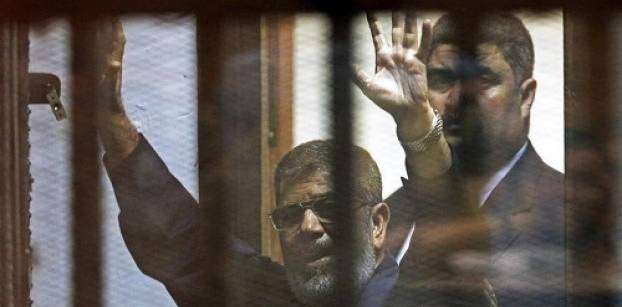Egypt court sentences Mursi to 40 yrs, six others to death in Qatar espionage case

Former President Mohamed Mursi during one of his trials. REUTERS (Archive)
CAIRO, Jun 18 (Aswat Masriya) - The Cairo criminal court sentenced on Saturday six defendants in the Qatar espionage case to death and handed former president Mohamed Mursi 40 years in prison.
The case involves 11 defendants including Mursi.
The former president received a life sentence (25 years) for leading a "terrorist group" and 15 years for leaking classified documents but the court cleared him of the espionage charge.
The verdict is not final and is appealable.
Mursi, who was ousted in July 2013, and the rest of the defendants, including two of his aides, are accused of leaking important national security documents and information on the Egyptian Armed Forces to Qatar during Mursi's tenure.
The six defendants who received death sentences include a documentary filmmaker Ahmed Afifi, a flight attendant Mohamed Kilany and a teaching assistant in the Misr University for Sciences and Technology Ahmed Ismail.
Asmaa al-Khatb, reporter for RASSD news network, along with Alaa Sablan and Ibrahim Helal, who both work for Qatari Al Jazeera channel, also received death sentences.
The six defendants were referred to the Grand Mufti last month to give his religious opinion after the court handed them preliminary death sentences then. The Grand Mufti upheld the court's decision.
Since his ouster, Mursi was featured in several trials where he faced an array of charges including other espionage charges, inciting to kill protesters outside the presidential palace during his tenure, insulting the judiciary and escaping prison during the January 2011 Uprising.
The former president received a death sentence for escaping Wadi al-Natroun prison, a life sentence in another espionage case and a 20-years prison sentence for inciting and demonstrating violence in the "Presidential Palace Clashes" case.
Mursi is still being tried for insulting the judiciary.
Mursi, who became Egypt's president in June 2012 after the first democratic elections in the country, was eventually ousted at the hands of the military following mass protests against his rule, after a year in power.
Egyptian-Qatari ties have been strained since Mursi's military ouster, with the authorities replacing Mursi's regime viewing Qatar as a Brotherhood sympathizer, using the Qatari Al Jazeera network for this aim.
Five months after Mursi's ouster, Egypt listed the Brotherhood as a terrorist organisation in December 2013 and insists it is behind the wave of militancy which has targeted security personnel since Mursi's ouster.
The Brotherhood continuously denies the accusations and maintains that the group's demonstrations are "peaceful".









facebook comments